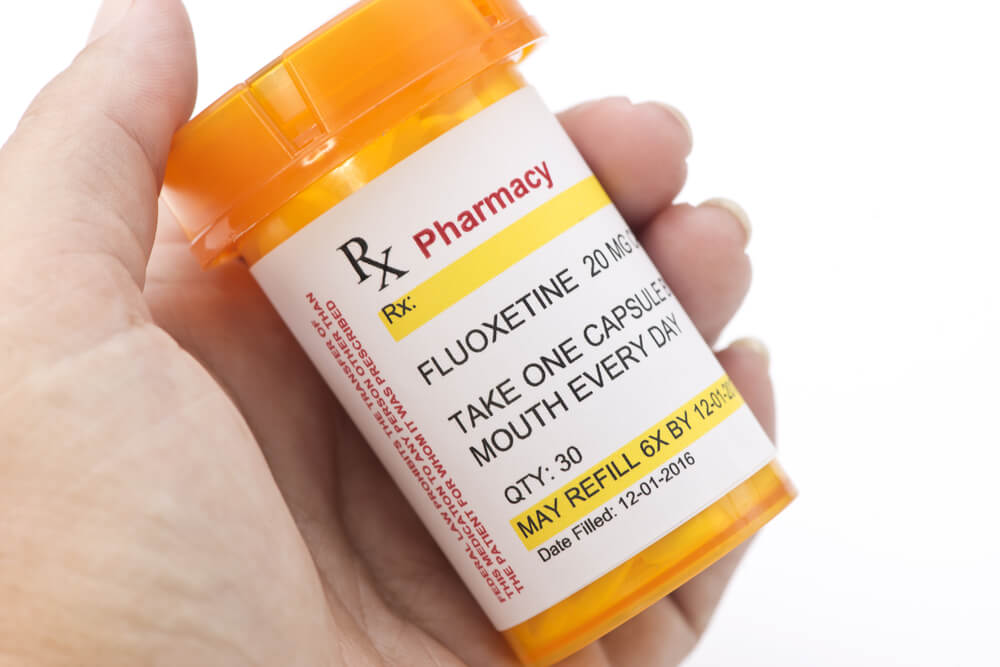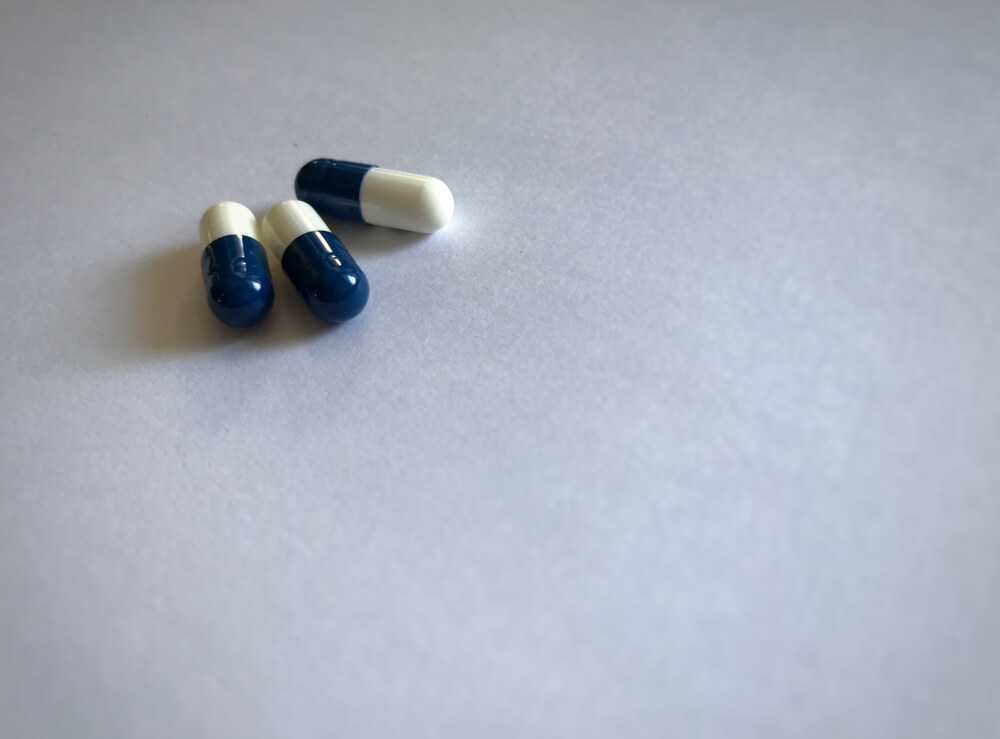Fluoxetine: Beating Depression

To talk about fluoxetine is to talk about the history of depression. This drug, which is part of the annals of pharmacology on the nervous system, is part of the antidepressants known as selective serotonin reuptake inhibitors (SSRI).
Fluoxetine was one of the first antidepressants to be marketed, under the name Prozac. So, we’re talking about a drug that is used to treat one of the most frequent and disabling diseases: depression. According to the World Health Organization, more than 300 million people suffer from it and it’s the leading cause of incapacity in developed countries.
In this article, we are going to talk about one of the most used treatments for depression: fluoxetine.
How does fluoxetine work?
If we access the interior of our brain, we will observe elongated structures, with a star-shaped body, which are our neurons. These cells are kept in constant communication by molecules such as serotonin, dopamine, and norepinephrine.
It’s serotonin that interests us in this case, since, in addition to being an essential transmitter in the brain, it has been related to mood, sleep and some basic functions of the nervous system.
Under certain conditions, serotonin is not at optimal levels and symptoms related to depression occur, such as apathy, sadness, insomnia, and irritability.
Fortunately, some medications are able to reverse this situation and increase serotonin in our brain. Fluoxetine is able to do just this.
To do so, it blocks enzymes that are responsible for removing serotonin from neurons once they have done their job. If these enzymes don’t work, serotonin continues to stimulate neurons, achieving the antidepressant effect.
What do you use it for?

Therefore, the first use of fluoxetine is for the treatment of depression. However, there are many other mental illnesses that are related to serotonin such as obsessive-compulsive disorder (OCD), some eating disorders such as bulimia nervosa, and intense phobia and panic.
You should always follow the medical opinion of the specialist psychiatrist who will consider appropriate the use of one of these antidepressants. In fact, on some occasions, it has also been used to treat alcoholism, attention deficit disorder, and borderline personality disorder.
The most important thing is to accept the diagnosis and treatment that we have been given and follow the guidelines indicated by the medical team.
How should it be used?

The dosage of the medication will be designed according to the pathology and symptoms, and there may be differences in the intake between one person and another.
In general, the recommended dose in cases of depression and OCD is 20 mg per day in adults, which usually corresponds to taking 1 tablet or capsule.
However, it’s advisable to assess the patient’s condition after 3 or 4 weeks, and it’s possible to increase the intake to 3 pills a day (60 mg/day) at most.
Fluoxetine achieves its maximum effect within a period of approximately 30 days, so the medical team will ask you for regular check-ups when you start treatment. All this with the aim of evaluating whether the dosage or the medicine are able to control the symptoms.
Missed dose

What happens if you miss a dose while taking this treatment? This situation should be avoided as much as possible, as missed doses could affect drug response.
However, if you should forget to take it, then you should take the missed dose as soon as you can. If it’s time for the next tablet then skip it and continue the schedule normally.
Since fluoxetine is usually taken once a day, it’s very important to stick to a specific time for taking it.
These days, there are numerous apps with alarm functions that can remind you to take your medication. You should look for your specific reminder to avoid these situations and get the best effect.
You may be interested in: The Differences Between a Disease and a Disorder
Should I take precautions with fluoxetine?
The answer is yes. Every medicine includes some precautions that must be taken into account, as well as being aware of some side effects that can develop.
Precautions to consider
In the first place, it is essential that during the medical consultation, you tell the specialist if you are taking any other medication. You should also mention possible natural remedies to treat minor symptoms. In many cases, herbal remedies can interact with the medication.
It should be taken into account that fluoxetine is a psychotropic drug and that it can produce alterations, which, albeit slight, can have an influence when driving or operating machinery. It should be avoided as a preventive measure.
As we have already said, you must attend the periodic check-ups assigned to you by your doctor. At 3-4 weeks it is usually evaluated whether or not the drug is meeting the required expectations.
In addition, keeping strict control of your medication will help fluoxetine to work optimally.
On the other hand, if the medical team considers that fluoxetine isn’t the most appropriate medication or that the treatment has ended, the withdrawal should be progressive. If we stop taking fluoxetine abruptly, serious adverse effects such as sleep disturbances or anxiety may appear.
Specific people groups

You should be more careful with children and adolescents. In them, it has been used especially to treat eating disorders.
In recent years it has been observed that treatment with fluoxetine can cause unexpected violent reactions, including serious suicidal tendencies.
However, you don’t need to be too concerned. These cases are reviewed very strictly, eliminating the drug as soon as any risk is observed. Follow the guidelines of the medical team and the instructions they give you.
Other particularly susceptible people are pregnant women. The prescription of fluoxetine is generally avoided during pregnancy. The highest risk occurs in the last trimester and, even though the complications won’t often be serious, the behavior is difficult to predict.
In any case, the possible benefit/risk relationship to accompany treatment with fluoxetine will be assessed.
Discover more here: What Is Minoxidil?
Adverse reactions

The possible reactions to fluoxetine are varied and, in many cases, unpredictable. However, fluoxetine isn’t associated with serious reactions if we take into account a correct administration and take special precautions.
Most reactions have been associated with joint use with other drugs with which they can interact to a greater or lesser extent.
Thus, reactions can range from simple nausea or headaches to more serious cardiac and nervous disorders. Loss of appetite is also common.
The reactions described are more frequent during the start of the treatment, and as adequate concentrations are achieved, over time, these will disappear.
In any case, you should notify the medical team that is monitoring any changes that you notice. You should always, of course, follow their instructions in the strictest possible way to achieve therapeutic success without problems.
Fluoxetine has been able to reduce and even eliminate certain situations. By following all the guidelines and advice and actively participating in your treatment, together with your healthcare professionals, you’ll be able to achieve the therapeutic goals to have a better quality of life.
To talk about fluoxetine is to talk about the history of depression. This drug, which is part of the annals of pharmacology on the nervous system, is part of the antidepressants known as selective serotonin reuptake inhibitors (SSRI).
Fluoxetine was one of the first antidepressants to be marketed, under the name Prozac. So, we’re talking about a drug that is used to treat one of the most frequent and disabling diseases: depression. According to the World Health Organization, more than 300 million people suffer from it and it’s the leading cause of incapacity in developed countries.
In this article, we are going to talk about one of the most used treatments for depression: fluoxetine.
How does fluoxetine work?
If we access the interior of our brain, we will observe elongated structures, with a star-shaped body, which are our neurons. These cells are kept in constant communication by molecules such as serotonin, dopamine, and norepinephrine.
It’s serotonin that interests us in this case, since, in addition to being an essential transmitter in the brain, it has been related to mood, sleep and some basic functions of the nervous system.
Under certain conditions, serotonin is not at optimal levels and symptoms related to depression occur, such as apathy, sadness, insomnia, and irritability.
Fortunately, some medications are able to reverse this situation and increase serotonin in our brain. Fluoxetine is able to do just this.
To do so, it blocks enzymes that are responsible for removing serotonin from neurons once they have done their job. If these enzymes don’t work, serotonin continues to stimulate neurons, achieving the antidepressant effect.
What do you use it for?

Therefore, the first use of fluoxetine is for the treatment of depression. However, there are many other mental illnesses that are related to serotonin such as obsessive-compulsive disorder (OCD), some eating disorders such as bulimia nervosa, and intense phobia and panic.
You should always follow the medical opinion of the specialist psychiatrist who will consider appropriate the use of one of these antidepressants. In fact, on some occasions, it has also been used to treat alcoholism, attention deficit disorder, and borderline personality disorder.
The most important thing is to accept the diagnosis and treatment that we have been given and follow the guidelines indicated by the medical team.
How should it be used?

The dosage of the medication will be designed according to the pathology and symptoms, and there may be differences in the intake between one person and another.
In general, the recommended dose in cases of depression and OCD is 20 mg per day in adults, which usually corresponds to taking 1 tablet or capsule.
However, it’s advisable to assess the patient’s condition after 3 or 4 weeks, and it’s possible to increase the intake to 3 pills a day (60 mg/day) at most.
Fluoxetine achieves its maximum effect within a period of approximately 30 days, so the medical team will ask you for regular check-ups when you start treatment. All this with the aim of evaluating whether the dosage or the medicine are able to control the symptoms.
Missed dose

What happens if you miss a dose while taking this treatment? This situation should be avoided as much as possible, as missed doses could affect drug response.
However, if you should forget to take it, then you should take the missed dose as soon as you can. If it’s time for the next tablet then skip it and continue the schedule normally.
Since fluoxetine is usually taken once a day, it’s very important to stick to a specific time for taking it.
These days, there are numerous apps with alarm functions that can remind you to take your medication. You should look for your specific reminder to avoid these situations and get the best effect.
You may be interested in: The Differences Between a Disease and a Disorder
Should I take precautions with fluoxetine?
The answer is yes. Every medicine includes some precautions that must be taken into account, as well as being aware of some side effects that can develop.
Precautions to consider
In the first place, it is essential that during the medical consultation, you tell the specialist if you are taking any other medication. You should also mention possible natural remedies to treat minor symptoms. In many cases, herbal remedies can interact with the medication.
It should be taken into account that fluoxetine is a psychotropic drug and that it can produce alterations, which, albeit slight, can have an influence when driving or operating machinery. It should be avoided as a preventive measure.
As we have already said, you must attend the periodic check-ups assigned to you by your doctor. At 3-4 weeks it is usually evaluated whether or not the drug is meeting the required expectations.
In addition, keeping strict control of your medication will help fluoxetine to work optimally.
On the other hand, if the medical team considers that fluoxetine isn’t the most appropriate medication or that the treatment has ended, the withdrawal should be progressive. If we stop taking fluoxetine abruptly, serious adverse effects such as sleep disturbances or anxiety may appear.
Specific people groups

You should be more careful with children and adolescents. In them, it has been used especially to treat eating disorders.
In recent years it has been observed that treatment with fluoxetine can cause unexpected violent reactions, including serious suicidal tendencies.
However, you don’t need to be too concerned. These cases are reviewed very strictly, eliminating the drug as soon as any risk is observed. Follow the guidelines of the medical team and the instructions they give you.
Other particularly susceptible people are pregnant women. The prescription of fluoxetine is generally avoided during pregnancy. The highest risk occurs in the last trimester and, even though the complications won’t often be serious, the behavior is difficult to predict.
In any case, the possible benefit/risk relationship to accompany treatment with fluoxetine will be assessed.
Discover more here: What Is Minoxidil?
Adverse reactions

The possible reactions to fluoxetine are varied and, in many cases, unpredictable. However, fluoxetine isn’t associated with serious reactions if we take into account a correct administration and take special precautions.
Most reactions have been associated with joint use with other drugs with which they can interact to a greater or lesser extent.
Thus, reactions can range from simple nausea or headaches to more serious cardiac and nervous disorders. Loss of appetite is also common.
The reactions described are more frequent during the start of the treatment, and as adequate concentrations are achieved, over time, these will disappear.
In any case, you should notify the medical team that is monitoring any changes that you notice. You should always, of course, follow their instructions in the strictest possible way to achieve therapeutic success without problems.
Fluoxetine has been able to reduce and even eliminate certain situations. By following all the guidelines and advice and actively participating in your treatment, together with your healthcare professionals, you’ll be able to achieve the therapeutic goals to have a better quality of life.
- Agencia Española del Medicamento y Productos Sanitarios. (n.d.). Ficha técnica de Fluoxetina. Retrieved from https://cima.aemps.es/cima/pdfs/es/ft/62661/FichaTecnica_62661.html.pdf
- OMS | Depresión. (2017). WHO. Retrieved from https://www.who.int/topics/depression/es/
- MedlinePlus. (2018). Fluoxetina: MedlinePlus medicinas. Retrieved December 30, 2018, from https://medlineplus.gov/spanish/druginfo/meds/a689006-es.html
Este texto se ofrece únicamente con propósitos informativos y no reemplaza la consulta con un profesional. Ante dudas, consulta a tu especialista.







